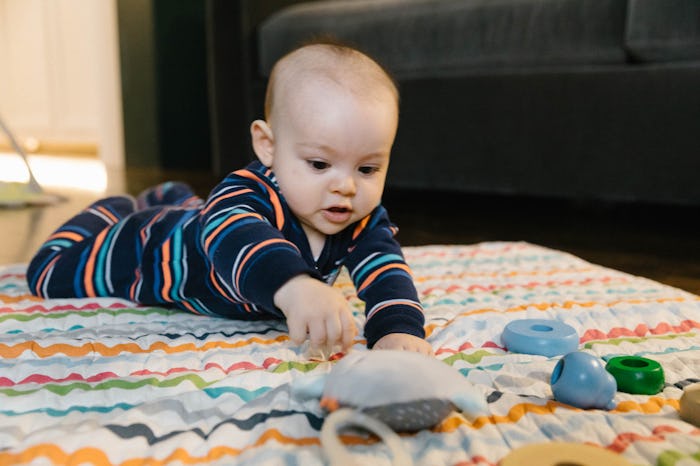Life
Here's Why Your Baby Is *So* Obsessed With Your Keys & How To Keep Them From Swiping
My sister is notorious for misplacing things. She regularly has to circle back after leaving my house to grab her jacket or purse, and she uses Find My iPhone on the daily to locate her cell phone. Keys are also notorious for getting lost in her household. Of course, I can't blame that one solely on her. Half of the time her keys go missing, it's the result of my 21-month-old nephew stashing them in his baby doll stroller or a random container or figurines. My sister is always asking, "Why does my baby love my keys?" A question to which she, of course, already knows the answer.
"Babies like keys because they are shiny, make jingling noise, and are small enough to fit into little hands," Texas-based Dr. Eboni Hollier, who is board-certified in both general and developmental and behavioral pediatrics, tells Romper in an email interview. "Adults always have them and very often take them away, so they must be awesome, right?"
Exactly — what's not to love? Well, actually there are quite a few things, Hollier says. Keys are made from metals, some of which may contain lead, according to Parents, and have you ever thought about all of the places your keys travel? Yeah, it's kind of gross.
"Keys can be unsafe because they are often dirty and are usually not cleaned often," Hollier says. "We definitely don't want any unnecessary germs going into a baby's mouth. They also are a choking risk and the sharp ends can potentially cause an eye injury." Keys could also hurt your little one's mouth should they fall while chewing on them, according to The Bump.
Experts say it's better to opt for toys that look like keys — or make similar fun noises — instead of the real thing. Check out Green Toys My First Keys Baby Toy ($8, Amazon) or Plan Toys Wooden Baby Key Set ($8, The Land of Nod). Of course, if your little one is all about the metal aspect of keys, then you should check out B. LucKeys ($10, Target) or Kleynimals toy keys. Both mimic metal keys, but are non-toxic and baby-safe.
Of course, transitioning a baby away from playing with your keys might be easier said than done. Elisabeth Stitt, parenting coach and author of Parenting as a Second Language, says that it's helpful to do your best to keep your keys out of sight and to not name them because "we tend to reinforce the names for objects that are important to us." If you do opt for an alternative set of keys for your baby, then let them know how special their particular set of keys is, Stitt tells Romper in an email interview.
"Say, 'Mommy has her keys. Where are baby’s keys? When everyone has their keys, we are ready to go!'" she suggests, adding that parents can make a game of using a baby’s keys to 'open' their car seat, pockets, and so forth. "The magic is not in the particular item; the magic is in the importance we attach." Stitt says a parent can create that importance by naming the object as special and perhaps connecting it to someone important, like a relative. Saying something like, “Here are the special rings Grandma gave you so you would think of her every time. Remember we Skyped with Grandma last night? Let’s Skype with her again, and you can show her her special rings," is something that Stitt says even an infant will begin to understand.
OK, so now that we have that one solved, I'm hoping someone can help me with another dilemma that's for a certain big kid I know — my sister. Any solutions for her particular brand of forgetfulness known as doing too many things at once? Anyone?
Ah well, it's a good thing I love you, sister.
Check out Romper's new video series, Romper's Doula Diaries:
Watch full episodes of Romper's Doula Diaries on Facebook Watch.
